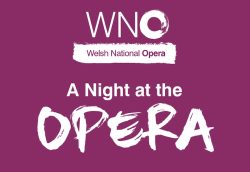 WELSH National Opera’s A Night at the Opera should not be confused with the Marx Brothers’ first film, made in 1935, when they left Paramount Pictures to join the always high production value studio of MGM. But WNO’s show has one major feature in common with the Marx Brothers film – it sets out to entertain its audiences.
WELSH National Opera’s A Night at the Opera should not be confused with the Marx Brothers’ first film, made in 1935, when they left Paramount Pictures to join the always high production value studio of MGM. But WNO’s show has one major feature in common with the Marx Brothers film – it sets out to entertain its audiences.
And with a mixture of much-loved favourites, including the overture to Don Giovanni, the Peasants’ Chorus and Dance from Eugene Onegin, arias from Madama Butterfly and the lyrical sounds of music from the Merry Widow and Die Fledermaus, rubbing shoulders with lesser-known works like Ethel Smyth’s Cliffs of Cornwall and Grace Williams The Parlour, it certainly provides a feast for any lover of either grand or light opera.
Guest soloists Giselle Allen, soprano, and Adam Gilbert, tenor, sang famous duets – including Mario, Mario, from the first act of Tosca – and individual party pieces such as Un bel di vedremo (Madama Butterfly] and Lensky’s aria Kuda, kuda from Tchaikovsky’s Eugene Onegin. But it was also an opportunity for the audience to sit back and thoroughly enjoy the talents of two of the WNO’S greatest assets – its orchestra and chorus.
The problem of where to place the orchestra in Bristol Hippodrome, where the pit is far too small to accommodate a full orchestra, is solved by seating them at the back of the stage, leaving the soloists and chorus with the front stage to display their wares. The result is a better balance between musicians and singers than can be obtained when a full scale opera is presented in this theatre.
Using a subtly-lit plain backcloth to great effect, and not asking the chorus to become involved in complex movement which might distract from their wonderful vocal input, director Emma Woods gets the balance between the visual and vocal presentation as ideal as conductor Finegan Downie Dear does between the orchestra and singers.
It was sad not to see more young people among the very appreciative audience, because if ever there was a programme ideally suited to introducing them to the joys of much-loved traditional operatic works, and the excitement of new music, this was it.
Strange to tell, when the chorus first appeared, as themselves, with no characters or distinctive costumes to hide behind, there were signs of nervousness. But by the time Bizet, Lehar and Strauss arrived to lead us into the interval, like greyhounds released from the slips, they were in full flow sending the audience out for their drinks and ice dreams with a joyful song in their hearts.
As the programme built to its truly grand finale, with the orchestra showing equal skills as accompanists and interpreters, and the chorus filling the theatre with the sort of inspirational sounds that only come from vocalists who love singing, it was inevitable that Puccini’s Nessun Dorma – led by Adam Gilbert – lived up to its heady reputation.
I have to admit that I was looking forward to hearing Ivor Novello’s We’ll Gather Lilacs as the encore piece, but after listening to the WNO chorus singing Arwel Hughes’ Gwahoddiad (Invitation) with real Welsh passion, I gladly stand aside to their choice.
GP